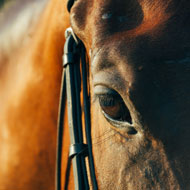Vets and medics join forces to remove horse’s sinus tumour

“We were able to remove a substantial portion of the tumor in order to open the sinus cavity and take any pressure off Honesto’s eye socket and brain." (Stock image)
Equine vets have teamed up with a human doctor to carry out the first image-guided removal of a sinus tumour in a horse.
Six-year-old horse Honesto had a massive sinus osteoma. Radiographs and a CT scan taken by the UC Davis veterinary hospital in California showed the mass was encroaching on his eye socket and blocking the right nasal cavity and numerous sinuses, including the frontal sinus directly in front of the brain.
Surgery was required to prevent the tumour growing and causing injury to the eye and brain. However, the usual method is to make a large incision in the area to burr and chisel the tumour away. Using this technique, there is no way for surgeons to determine how close they are to critical areas such as the eye and brain.
Deciding how to proceed, Honesto’s owner Angela Langen discussed the case with her close friend George Domb, who is an ear, nose and throat doctor. He suggested a method used in human medicine, which uses an image-guided navigation system so that surgeons can operate on the tumour whilst identifying the precise position of their instruments on a CT scan.
Dr Domb worked with Dr Larry Galuppo, chief of the equine surgery and lameness service at UC Davis, to undertake the procedure.
Honesto recovered well from the anaesthesia and returned home two days after surgery. At his one-week check up, Dr Galuppo noted significant progress and removed his sinus irrigation tube. After another week, Honesto’s skin staples were removed.
“We were pleased to see that the procedure worked well,” said Dr Galuppo. “We were able to remove a substantial portion of the tumor in order to open the sinus cavity and take any pressure off Honesto’s eye socket and brain. He’s one tough horse.”
Dr Domb added: “This was the first time I’ve ever seen surgery on a horse, much less participated. It was amazing how the anesthesia team took care of Honesto, and collaborating with the entire veterinary team at UC Davis was a wonderful experience. Dr. Galuppo and everyone on the equine surgery team made the whole procedure flawless.
The team plan to have further discussions about utilising human sinus treatments in veterinary medicine.



 The latest
The latest